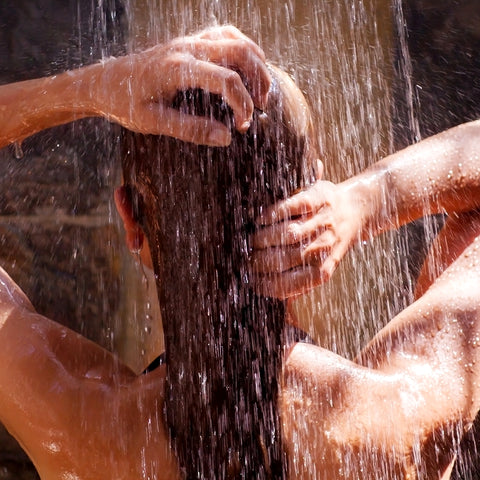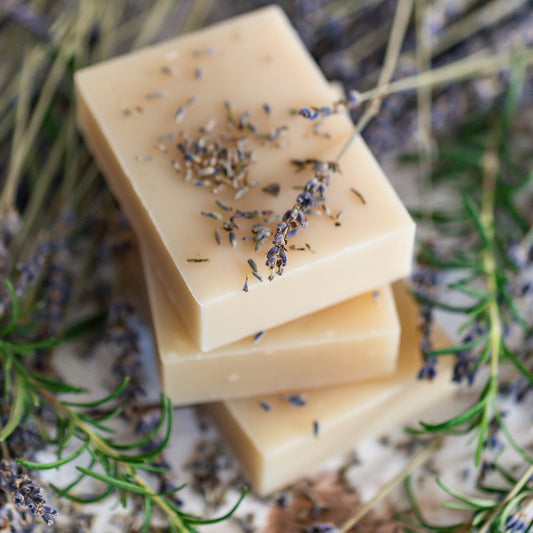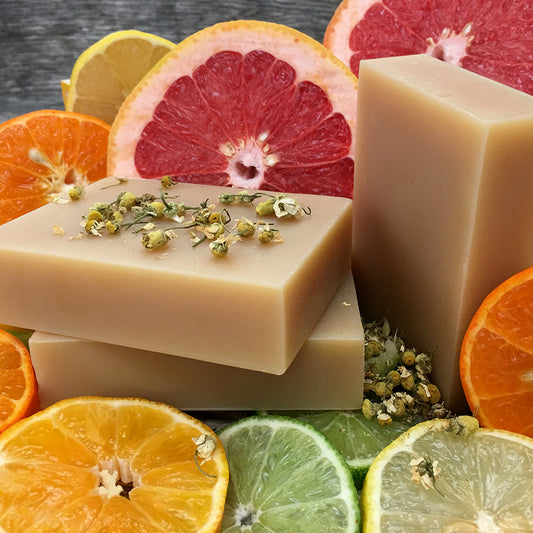How To Use A Natural Shampoo Bar
For some the thought of changing the way you wash your hair can be scary.
Each of us is unique. We each have a typical care routine we are accustom to using. We have different hairstyles, cuts, lengths, and textures that play a role in how we care for and style our hair.
 But despite these differences, we all want a clean, healthy scalp and clean healthy hair.
But despite these differences, we all want a clean, healthy scalp and clean healthy hair.
Natural shampoo bars are easy to use.
But if you are hesitant about using a natural shampoo bar, here is our recommendation, give a sample bar a try! Wash your hair a few times and if you decide it is not for you, try another sample or go back to your original shampoo method. You can always use the shampoo bar as a body soap, hand soap, or travel bar, so it never wasted.
If you are new to shampoo bars, finding the right bar is important but I believe that using the proper technique to wash your hair is the best way to ensure a successful transition from synthetic shampoo to natural shampoo bars.
If you have a technique that works for you, please leave a comment to share with others.
Prepare Your Hair Before Shampooing
When switching to a natural shampoo bar, it is important to remove natural and product buildup from your hair. This step is especially important if you use lots of products on your hair. Many people that have problems adjusting to shampoo bars often skip this step.
Your hair can have build-up or residue from using commercial products like sulfate shampoos, conditioners, spray, gels, etc. These products are often made with synthetic substances such as silicones, waxes, and petroleum-based ingredients that are added to make our hair look shiny and full of volume. In reality, over time they simply coat the hair which leaves a residue.
Your hair can also have natural build-up. This is the natural residue that makes your hair dirty caused by the build-up of scalp oils, sweat, dead skin, and environmental pollutants.
Gentle cleansing natural shampoo bars are not good at removing a lot of build-up. Doing a prewash with a Vinegar or Baking Soda Rinse can help prepare your hair and scalp and remove the build-up which can make your hair dull and lifeless.
Please read our blog Hair And Scalp Build-Up? What Can Help?for rinse recipes and helpful hints about build-up
Why Is A Shampooing Technique Important?
Your shampoo technique may be the most critical part to ensure success with a natural shampoo bar.
The purpose of shampooing your hair is to remove dirt and excess oils from the roots. You do NOT need to apply shampoo from roots to tips.
Focus only on your scalp. As you use your fingers to rinse the lather through the strands, there is enough shampoo to clean the length.
Our natural shampoo bars are a lot more concentrated than liquid shampoos. They are also Superfatted and thus contain extra oils and butters to nourish your hair.
If you do not build a nice lather and rinse really well you will have areas that remain coated with the soap oils, which can make it look or feel “gummy.”
If you are used to commercial shampoo and shampoo twice, you will have already noticed that the second wash produces a lot more lather. The first wash is mixing with the dirt and excess oil in your hair so the second wash is working on cleaner hair. The same is true for our shampoo bars.
So lather up, once, twice, maybe even three times at first. Then be sure to rinse, rinse, rinse!!! Again, if you have long hair, pay special attention to the middle back of the hair so that you rinse all of the shampoo out of your hair.
***Notice in the techniques below that we do NOT recommend lathering up the length of your hair with the shampoo bar!
As you use your fingers to rinse the lather through the strands, there is enough shampoo to clean the length. These techniques help prevent coating your hair strands with concentrated shampoo that can be difficult to rinse away.
A Shampoo Technique for Natural Shampoo Bars
These techniques to create lather help prevent pockets of shampoo residue in the length of your hair especially if you are new to natural shampoo bars, have adjustment issues, or have long or thick hair.
Wet Hair: One of the most important steps is to begin with thoroughly wet hair--I mean a lot of water. Be sure that the water saturates your hair all the way down to the roots.
Create the Lather: There are two possible ways both of which help prevent pockets of shampoo residue left in your hair that can make hair feel tacky.
- Create a nice foamy lather by rubbing the wet bar between your hands and use only the lather to wash your scalp. This is the best method for people with thick hair, curly hair, coarse coily/kinky hair, and those new to shampoo bars.
- Create a nice foamy lather by rubbing the shampoo bar on the TOP of your head only. Rub in only one direction to prevent tangling. This method can work well for thinner hair types.
 Massage the Lather into your Scalp only at the roots of the hair until you work up a really good lather
Massage the Lather into your Scalp only at the roots of the hair until you work up a really good lather
- It is very important to work the shampoo into your scalp with water and really build up a good lather so there are no patches of shampoo left on your hair.
- Lathering up also allows the dirt and extra oils to be washed away.
- If the lather is not foamy enough, add more water.
Using your Fingers like a Comb: smooth the lather down the length of your hair as you rinse with water. To prevent tangles, be sure to always work from the top down, use your fingers like a comb, not a mixer, and don't pile your hair on your head,
Rinse, rinse, rinse, rinse and rinse again. I cannot stress how important this step is to shampoo bar success. In order to remove the excess shampoo, which can leave a filmy feeling and weigh hair down, do NOT rush this step! The rinsing should take longer than washing and lathering time.
- If your hair is long or thick, lift up sections of your hair to ensure that all of the shampoo is rinsed clean. Don’t neglect parts of your head that are more difficult to reach, such as the nape of your neck or the back of your head.
- Repeat if desired but I found that as my hair adjusted I only needed one round of shampoo.
Relax, you can wash your hair with natural shampoo every day if you desire! It cleans thoroughly without drying or coating your hair or scalp. Dry and style your hair as normal.
Ida's Favorite Shampoo Technique for Long Hair
Men and women with short hair seldom have adjustment problems. Folks with long hair have to experiment a bit and I have found that the technique can make all the difference. The most common spot for build-up, especially for people with long hair, is at the back of the head and the nape of the neck.
This technique allows me concentrate only on my scalp and avoid rubbing the shampoo bar lather on the length of my hair. I have found that just rinsing over the ends will keep them clean.
 You have to experiment with your unique hair type. I have long, fine hair.
You have to experiment with your unique hair type. I have long, fine hair.
Below is my technique for using a shampoo bar.
- tie my long hair into a loose ponytail
- thoroughly wet my hair -- really wet
- wet the shampoo bar and rub the bar across the top of my head only in strokes from front to back until I have covered the entire scalp area. (I have found that if I rub any shampoo vigorously in all directions, my fine long hair gets very tangled). I continue to add water as I create the lather in order to allow the shampoo bar to do its job. (You can also use lather created in your hands)
- massage my entire scalp in a combing motion to work up a really good lather. I do not rub the bar or work the lather on the length of my hair.
- take out my ponytail and rinse, rinse, rinse, rinse allowing the shampoo to drip down the length of my hair. (I have found that this rinsing is enough to clean the length of my hair.)
- rinse for at LEAST one minute as I rub my fingers through my hair to be sure that all of the shampoo is rinsed away
- squeeze gently on the length to remove excess water and cover with a towel while I dry off the rest of me. I do not rub the towel over my wet hair because it causes nasty tangles.
- use a wide-toothed comb and gently comb from the bottom up
- dry and style as usual
A quick note: After a few months of using this technique I was able to learn to carefully wash only my scalp without creating a ponytail.
Notice in the techniques above that we do NOT recommend lathering up the length of your hair with the shampoo bar. As you use your fingers to rinse the lather through the strands, there is enough shampoo to clean the length. These techniques help prevent coating your hair strands with shampoo residue.
Natural shampoo bars are easy to use. While finding the right shampoo bar is important, I believe that using the proper technique to wash your hair is one of the best ways to ensure a successful transition from synthetic shampoo to natural shampoo bars.

Why Use A Natural Shampoo Bar?
Tips When Changing To A Natural Shampoo Bar
Everything You Want To Know About Shampoo Bars
Hair and Scalp Build-Up? What Can Help?
Make Your Own Natural Vinegar Hair Rinse
How Does Your Water Affect Your Hair?
What Is The Difference Between Soap Bars and Shampoo Bars?
If You Try A Shampoo Bar Once And It Does Not "Work" Is It a Sign That It Is Bad For You?
Share Your Natural Shampoo Bar Technique







